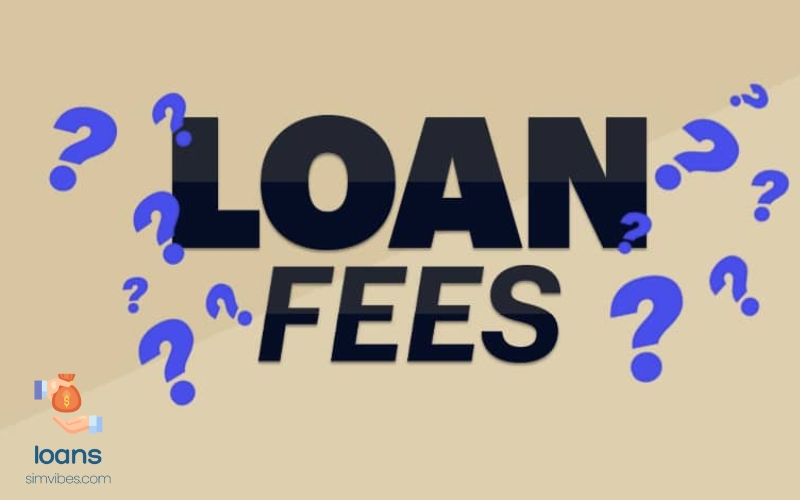These fees can affect the total cost of the loan and affect the borrower’s ability to pay. Therefore, it is extremely important to understand the types of fees related to loans. This article will help you fully understand these fees and how they can affect your decision to borrow money.
1. PROCESSING FEE (ASSESSMENT FEE)
A processing fee, also known as an assessment fee, is a fee that borrowers must pay when submitting a loan application. This fee is collected by banks and financial institutions to offset the costs of reviewing loan applications. Collecting this fee helps the lending institution maintain the appraisal department and evaluate the borrower’s ability to repay.
Processing fees can vary from financial institution to financial institution, with fees typically ranging from 0.5% to 2% of the loan amount. While this fee may not seem like a large amount, if not calculated carefully, it can add significantly to the cost of borrowing.

2. COLLATERAL PROCESSING FEES
For secured loans (such as home loans, car loans), the lending institution will require the borrower to provide assets to secure the loan. Processing collateral includes procedures such as asset valuation, ownership registration, and work related to protecting the asset during the loan period.
Collateral processing fees may include asset valuation fees, asset ownership registration fees with state agencies, and other related costs. These fees are usually charged once and may vary depending on the value of the collateral. However, secured loans will usually have lower interest rates and may be more affordable overall.
3. INSURANCE FEES
Some types of loans, especially secured loans, require the borrower to insure the property. This insurance protects the lending institution in the event of loss or damage to the property. The insurance premium is usually calculated as a percentage of the value of the property borrowed.
In addition to property insurance, some financial institutions may also require the borrower to purchase life insurance to protect the borrower’s ability to repay the loan in the event of a health risk or death. This fee can be quite high, especially for borrowers who are older or in poor health. Therefore, borrowers should carefully calculate insurance premiums when borrowing money.
4. EARLY PAYMENT FEE (EARLY PAYMENT FEE)
An early payment fee, also known as an early repayment fee, is a fee that a borrower must pay if they decide to pay off a loan before the agreed upon term in the contract. Although early repayment helps borrowers reduce the amount of interest they have to pay, financial institutions often apply this fee to compensate for the interest they will lose when the loan is paid off early.
This fee usually ranges from 1% to 5% of the prepayment amount, depending on the bank or lending institution. For those who plan to pay off their debt quickly, it is important to pay attention to this fee to avoid unnecessary additional costs.
5. LATE PAYMENT FEE
A late payment fee is a fee that a borrower must pay if they do not make payments on time according to the schedule agreed upon in the loan contract. Late payments will incur additional fees, and if this situation persists, it can lead to being classified as a bad debt, affecting your credit score and ability to borrow money in the future.
Late payment fees are usually calculated as a percentage of the outstanding amount, which can range from 1% to 3% per month. Lending institutions often encourage borrowers to pay on time to avoid this fee and protect their credit history.
6. CREDIT CARD ISSUANCE FEES (FOR UNSECURED LOANS)
For unsecured loans, some financial institutions will require the issuance of a credit card or provide other services such as credit card loans. In this case, the borrower will have to pay a credit card issuance fee. Although this fee may be low, it still needs to be calculated into the total cost of the loan.
Additionally, credit cards may come with annual fees or usage charges, which borrowers should also be aware of to avoid incurring unwanted costs.
7. CASH WITHDRAWAL FEES (FOR UNSECURED LOANS)
For unsecured loans issued through credit cards or other forms of quick loans, borrowers may be charged a fee when withdrawing cash from their card or loan account. Cash advance fees can be quite high, typically ranging from 3% to 5% of the withdrawal amount, and may add up if the borrower fails to repay on time.
Cash withdrawals from unsecured loans should be carefully considered as the withdrawal fee can significantly increase your total loan costs.
8. DEBT CHANGE FEES
Debt conversion is when a borrower requests to convert their loan to another type of loan or to change the repayment period. This may incur additional debt conversion fees that the borrower must pay to the financial institution. Debt refinancing fees are often applied when you want to change your loan terms or repayment period to make it easier to manage your finances.
CONCLUSION
Borrowing money is not only related to interest rates but also has many fees that arise throughout the loan process. These fees can affect the total cost of the loan and the borrower’s ability to pay, so it is extremely important to understand the fees related to the loan. Borrowers need to carefully study these fees before deciding to borrow money, and have a clear financial plan to avoid unnecessary fees.
